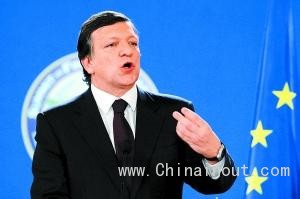國際貨幣體系正在發(fā)生變化,。金磚國家(Brics)成立了自己的開發(fā)銀行,,因為國際貨幣基金組織(IMF)承諾賦予它們與各自經(jīng)濟實力相稱的話語權(quán),參與IMF的運營,卻一次次食言,。巴西,、俄羅斯、印度和中國還計劃建立外匯儲備池,,避免在發(fā)生危機的時候被迫依賴IMF,。
歐元區(qū)危機在某些方面證明了多邊主義舊秩序的價值。誠然,,IMF一開始在歐盟(EU)和歐洲央行(ECB)的要求下,,同意了一項建立在空想假設(shè)前提下的紓困計劃。但IMF后來態(tài)度轉(zhuǎn)強硬,。它堅持要求充分認識希臘和塞浦路斯的債務(wù)和銀行業(yè)問題的嚴重程度,,并要求對其他困難經(jīng)濟體所必需的改革進行現(xiàn)實的評估。如果沒有IMF的介入,,歐洲國家或許會堅持相信自己的錯覺,。
這些舉動證明了IMF的價值,但其合法性仍然存疑,。新興市場嚴重懷疑,,如果它們陷入麻煩,從IMF獲得的貸款會更少,,條款也會更苛刻,。在IMF調(diào)停貨幣戰(zhàn)時,新興市場看到的情況是,,當發(fā)展中國家試圖通過貨幣貶值尋求競爭優(yōu)勢時,,IMF的反應(yīng)很不耐煩,但當西方大型經(jīng)濟體推出也可被視為某種競爭性貶值的大規(guī)模貨幣寬松計劃時,,IMF卻輕易默許,。
IMF的真實強項在于其評估各國宏觀經(jīng)濟政策和金融政策的能力,以及評估這些政策對全球經(jīng)濟影響的能力,。IMF應(yīng)該將評估作為自己的主業(yè),。如果它不再親身上陣、參與問題經(jīng)濟體的紓困工作,,那么它在評估工作上會做得更好,。集兩個職能于一身,使得IMF毫無必要地成為易受偏袒指責的靶子,。
附加條件的貸款可以由地區(qū)保險池來處理,,如有必要的話,IMF可給予支援,。在發(fā)生危機的時候,,可以讓IMF出面制定一個實際可行的方案,,供一國修正政策時借鑒。這個國家可同時與相關(guān)的地區(qū)貨幣基金談判,,得出一個貸款方案,。只要對IMF的建議打任何折扣,問題國家從本地區(qū)集團的其他成員國接受了多少補貼就會顯露無遺,。這樣的決策將是政治性的,,始終如此。但同一集團中的其他國家能充分知曉它們對“自己人”紓困的成本是多少,。
在地區(qū)保險池中占有主導地位的國家,,是否有可能因卑鄙的政治原因破壞較小國家的借款計劃?有可能,,但因為IMF也可以提供貸款,,使得大國隨心所欲操縱地區(qū)保險池的威脅降低了。
一些西方政策制定者一直主張,,允許地區(qū)基金與IMF競爭,,可能引發(fā)逐底競爭(race to the bottom),國家可能會讓潛在的紓困者“鶴蚌相爭”,,以期為自己爭取到不那么苛刻的條款,。這是偽命題。IMF和地區(qū)基金擁有同樣的動機去維持自己的可信度,、保護自己的投資,。它們有充分理由致力于實現(xiàn)良好的經(jīng)濟效益。
與其對中國計劃成立與IMF針鋒相對的組織表示不滿,,美國和其他發(fā)達經(jīng)濟體應(yīng)該更迅速地采取行動,,改革它們所主導的那些組織的治理。合作并不像人們說的那樣好,。IMF長期以來一直宣揚加大競爭,、加強市場紀律以打破舒服現(xiàn)狀的好處?;蛟S施行這兩項原則對IMF本身、以及國際金融治理體系也有好處,。(中國進出口網(wǎng))

Change is coming to the international monetary system. Weary of broken promises to give them a say in the running of the International Monetary Fund that matches their economic heft, the so-called Brics countries have set up their own development bank. Brazil, Russia, India and China also plan to pool foreign exchange reserves and avoid having to rely on the IMF during crises.
The eurozone crisis in some ways demonstrated the worth of the old multilateral order. True, the IMF at first went along with a rescue programme premised on fanciful assumptions at the behest of the EU and the European Central Bank. But the Fund subsequently stiffened its spine. It insisted on recognising the full extent of the debt and banking problems in Greece and Cyprus, and demanded a realistic assessment of reforms needed in other troubled economies. Left to themselves, Europeans might have stuck to their delusions.
Such actions demonstrate the IMF’s worth. But its legitimacy remains in doubt. Emerging markets harbour a strong suspicion that if they found themselves in trouble, they would receive smaller loans under more stringent conditions. When it comes to mediating currency wars they see an institution that is impatient when developing countries seek competitive advantage in a weak currency – but which readily acquiesces when big western economies embark on massive programmes of monetary easing that might also be seen as a form of competitive devaluation.
The IMF’s real strength is its ability to assess countries’ macroeconomic and financial policies and evaluate what they mean for the world economy. The Fund should make these assessments its main job. It could do them better if it was no longer doing the frontline work of rescuing troubled economies. Combining the two functions makes it needlessly vulnerable to accusations of favouritism.
Lending with conditions could be managed by regional insurance pools and backed up by IMF money if needed. At a time of crisis, the IMF would be called upon to develop a realistic plan for a country to rectify its policies. The country would simultaneously negotiate with the relevant regional monetary fund for a loan programme. Any watering down of the IMF’s recommendations would make it obvious how much the country in trouble was being subsidised by others in its regional group. Such decisions would be political, as they always are. But other countries in the group would be fully informed about the costs of bailing out one of their own.
Could a dominant country in a regional pool sabotage a smaller country’s borrowing for petty political reasons? Yes, but the option of an IMF loan takes the edge off large countries’ threats to run the regional insurance pools however the fancy takes them.
Some western policy makers have argued that allowing regional funds to compete with the IMF could trigger a race to the bottom, in which countries play different would-be rescuers off against each other in an attempt to negotiate less onerous conditions. This is a red herring. The IMF and the regional funds would have the same incentives to maintain their credibility and protect their investment. They have strong reasons to aim for good economic outcomes.
Rather than whinge about China’s plans to set up competing institutions, the US and other advanced economies ought to take quicker action to reform the governance of the ones they dominate. Co-operation is not all it is cracked up to be. The IMF has long advocated the benefits of greater competition and market discipline in place of the cosy status quo. Perhaps the IMF itself, and the governance system for global finance, would be better served by being subject to some of both.
歐元區(qū)危機在某些方面證明了多邊主義舊秩序的價值。誠然,,IMF一開始在歐盟(EU)和歐洲央行(ECB)的要求下,,同意了一項建立在空想假設(shè)前提下的紓困計劃。但IMF后來態(tài)度轉(zhuǎn)強硬,。它堅持要求充分認識希臘和塞浦路斯的債務(wù)和銀行業(yè)問題的嚴重程度,,并要求對其他困難經(jīng)濟體所必需的改革進行現(xiàn)實的評估。如果沒有IMF的介入,,歐洲國家或許會堅持相信自己的錯覺,。

這些舉動證明了IMF的價值,但其合法性仍然存疑,。新興市場嚴重懷疑,,如果它們陷入麻煩,從IMF獲得的貸款會更少,,條款也會更苛刻,。在IMF調(diào)停貨幣戰(zhàn)時,新興市場看到的情況是,,當發(fā)展中國家試圖通過貨幣貶值尋求競爭優(yōu)勢時,,IMF的反應(yīng)很不耐煩,但當西方大型經(jīng)濟體推出也可被視為某種競爭性貶值的大規(guī)模貨幣寬松計劃時,,IMF卻輕易默許,。
IMF的真實強項在于其評估各國宏觀經(jīng)濟政策和金融政策的能力,以及評估這些政策對全球經(jīng)濟影響的能力,。IMF應(yīng)該將評估作為自己的主業(yè),。如果它不再親身上陣、參與問題經(jīng)濟體的紓困工作,,那么它在評估工作上會做得更好,。集兩個職能于一身,使得IMF毫無必要地成為易受偏袒指責的靶子,。
附加條件的貸款可以由地區(qū)保險池來處理,,如有必要的話,IMF可給予支援,。在發(fā)生危機的時候,,可以讓IMF出面制定一個實際可行的方案,,供一國修正政策時借鑒。這個國家可同時與相關(guān)的地區(qū)貨幣基金談判,,得出一個貸款方案,。只要對IMF的建議打任何折扣,問題國家從本地區(qū)集團的其他成員國接受了多少補貼就會顯露無遺,。這樣的決策將是政治性的,,始終如此。但同一集團中的其他國家能充分知曉它們對“自己人”紓困的成本是多少,。
在地區(qū)保險池中占有主導地位的國家,,是否有可能因卑鄙的政治原因破壞較小國家的借款計劃?有可能,,但因為IMF也可以提供貸款,,使得大國隨心所欲操縱地區(qū)保險池的威脅降低了。
一些西方政策制定者一直主張,,允許地區(qū)基金與IMF競爭,,可能引發(fā)逐底競爭(race to the bottom),國家可能會讓潛在的紓困者“鶴蚌相爭”,,以期為自己爭取到不那么苛刻的條款,。這是偽命題。IMF和地區(qū)基金擁有同樣的動機去維持自己的可信度,、保護自己的投資,。它們有充分理由致力于實現(xiàn)良好的經(jīng)濟效益。
與其對中國計劃成立與IMF針鋒相對的組織表示不滿,,美國和其他發(fā)達經(jīng)濟體應(yīng)該更迅速地采取行動,,改革它們所主導的那些組織的治理。合作并不像人們說的那樣好,。IMF長期以來一直宣揚加大競爭,、加強市場紀律以打破舒服現(xiàn)狀的好處?;蛟S施行這兩項原則對IMF本身、以及國際金融治理體系也有好處,。(中國進出口網(wǎng))

Change is coming to the international monetary system. Weary of broken promises to give them a say in the running of the International Monetary Fund that matches their economic heft, the so-called Brics countries have set up their own development bank. Brazil, Russia, India and China also plan to pool foreign exchange reserves and avoid having to rely on the IMF during crises.
The eurozone crisis in some ways demonstrated the worth of the old multilateral order. True, the IMF at first went along with a rescue programme premised on fanciful assumptions at the behest of the EU and the European Central Bank. But the Fund subsequently stiffened its spine. It insisted on recognising the full extent of the debt and banking problems in Greece and Cyprus, and demanded a realistic assessment of reforms needed in other troubled economies. Left to themselves, Europeans might have stuck to their delusions.
Such actions demonstrate the IMF’s worth. But its legitimacy remains in doubt. Emerging markets harbour a strong suspicion that if they found themselves in trouble, they would receive smaller loans under more stringent conditions. When it comes to mediating currency wars they see an institution that is impatient when developing countries seek competitive advantage in a weak currency – but which readily acquiesces when big western economies embark on massive programmes of monetary easing that might also be seen as a form of competitive devaluation.
The IMF’s real strength is its ability to assess countries’ macroeconomic and financial policies and evaluate what they mean for the world economy. The Fund should make these assessments its main job. It could do them better if it was no longer doing the frontline work of rescuing troubled economies. Combining the two functions makes it needlessly vulnerable to accusations of favouritism.
Lending with conditions could be managed by regional insurance pools and backed up by IMF money if needed. At a time of crisis, the IMF would be called upon to develop a realistic plan for a country to rectify its policies. The country would simultaneously negotiate with the relevant regional monetary fund for a loan programme. Any watering down of the IMF’s recommendations would make it obvious how much the country in trouble was being subsidised by others in its regional group. Such decisions would be political, as they always are. But other countries in the group would be fully informed about the costs of bailing out one of their own.
Could a dominant country in a regional pool sabotage a smaller country’s borrowing for petty political reasons? Yes, but the option of an IMF loan takes the edge off large countries’ threats to run the regional insurance pools however the fancy takes them.
Some western policy makers have argued that allowing regional funds to compete with the IMF could trigger a race to the bottom, in which countries play different would-be rescuers off against each other in an attempt to negotiate less onerous conditions. This is a red herring. The IMF and the regional funds would have the same incentives to maintain their credibility and protect their investment. They have strong reasons to aim for good economic outcomes.
Rather than whinge about China’s plans to set up competing institutions, the US and other advanced economies ought to take quicker action to reform the governance of the ones they dominate. Co-operation is not all it is cracked up to be. The IMF has long advocated the benefits of greater competition and market discipline in place of the cosy status quo. Perhaps the IMF itself, and the governance system for global finance, would be better served by being subject to some of both.











